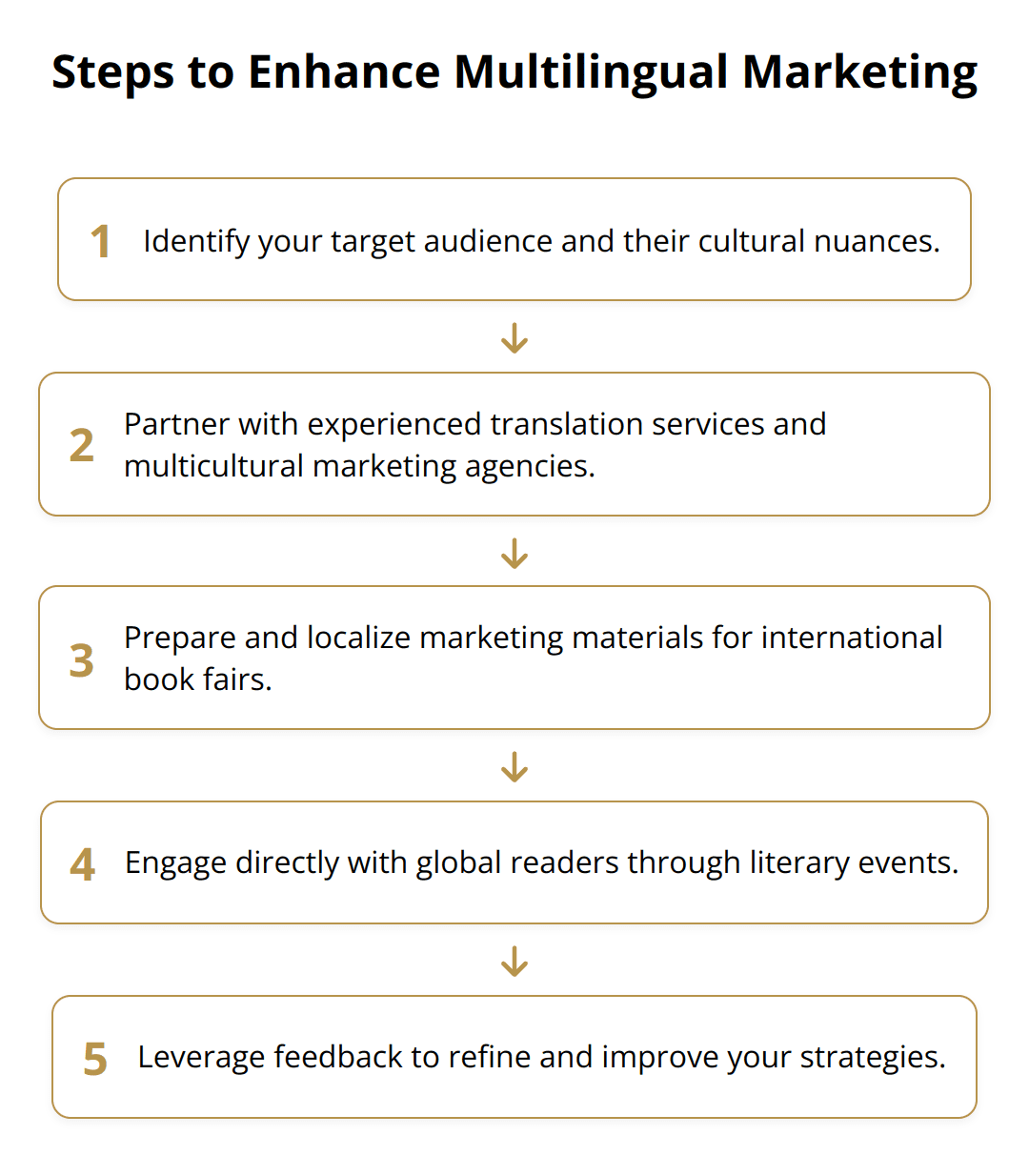At Beverly Hills Publishing, we understand the power of reaching a global audience. Multilingual book marketing opens doors to diverse cultures, expanding a book’s reach far beyond its original language and market.
It’s not just about translation; it’s about connecting with readers on a cultural level. This approach not only boosts sales but also enhances the overall brand recognition of authors and publishers alike.
Why Go Multilingual?
In the realm of book marketing, embracing multilingual strategies is not just an option; it’s a necessity for authors aiming to make a significant impact on a global scale. Ignoring the potential of non-English speaking markets is tantamount to leaving money on the table. This chapter dives into actionable tactics and insights to effectively harness the power of multilingual book marketing.
Breaking Language Barriers: The first step to successful multilingual marketing is breaking language barriers. This involves more than just translating text; it’s about conveying the essence and emotions of your work. Professional translation services that specialize in literary works are indispensable. They ensure that cultural nuances and idioms are accurately translated, thus maintaining the integrity of your message across different languages.

Localization: It’s imperative to localize content. This means adapting your book descriptions, author bios, and marketing messages to align with cultural norms and values of your target audience. For example, humor, which greatly varies across cultures, needs careful translation to avoid misinterpretation. Additionally, localized cover designs that appeal to local sensibilities can greatly enhance your book’s appeal.
Strategic Engagement with Local Communities: Establishing partnerships with local influencers, bloggers, and book clubs can amplify your reach. Identify key influencers within your target markets who align with your book’s theme or genre. Collaborating on promotional content or engaging in virtual book tours within these communities can foster a deeper connection with your audience.
Adopting Digital Tools for Wider Reach: Utilize digital platforms to bridge the gap between you and your global audience. Platforms like Goodreads offer the opportunity to connect with readers worldwide. Social media platforms, if used wisely with targeted multilingual content, can significantly increase your visibility among non-English speaking readers.
Multilingual SEO: Implementing multilingual SEO strategies on your website ensures that readers searching in their native languages can easily find your books. Keywords, meta descriptions, and tags should be translated and localized to rank well in search engines across different countries.

Practical Tips
- Invest in Quality Translations: Always opt for professional translation services with experience in literary works.
- Focus on Localization: Adapt your book’s marketing materials to resonate with local cultures and traditions.
- Leverage Local Influencers: Partner with influencers within your target markets for authentic promotion.
- Utilize Digital Platforms: Engage with global audiences through social media and reader platforms.
- Implement Multilingual SEO: Make sure your online presence is optimized for various languages to improve visibility.
By incorporating these strategies into your book marketing plan, you are not just expanding your audience globally; you’re also respecting and acknowledging the diverse cultures that make up your potential readership. The result is a more inclusive, far-reaching impact that transcends language barriers, enriching both the reader’s experience and your brand recognition worldwide.
Crafting Effective Global Campaigns
Successfully marketing books on a global scale requires understanding and respecting the diversity of your audience. Tailoring your marketing messages for different cultures, harnessing the power of social media for widespread reach, and collaborating with local publishers are indispensable strategies for multilingual book marketing.
Cultural Sensitivity Is Key
When expanding into new markets, it’s essential to tailor your marketing messages. What resonates with one culture might not with another. Humor, symbolism, and even colors can have varying connotations across different societies. Therefore, understanding these nuances and incorporating them into your marketing efforts will not only prevent potential missteps but also strengthen your connection with the target audience. Engaging with cultural consultants can provide invaluable insights into local customs and preferences, ensuring that your book and its promotional material are well-received.
Social Media: A Gateway to Global Audiences
Social media platforms offer unparalleled opportunities to reach and engage with a global audience instantly. However, effective use goes beyond mere translation of content. It involves creating specific strategies for each platform and region. For example, while Facebook and Twitter might be popular in many Western countries, platforms like Weibo in China or VK in Russia dominate their respective markets. Tailoring your approach to each platform and leveraging their specific features can dramatically increase your book’s visibility and appeal across diverse regions. For insights on optimizing your social media strategy, exploring resources like social media tips can be beneficial.
Leveraging Local Expertise
Collaborating with local publishers and distributors can significantly enhance your book’s market penetration. Local partners possess an intimate understanding of the market, including reader preferences, popular genres, and effective distribution channels. They also have established networks and relationships that can facilitate smoother entry into the market and better positioning of your book. It’s important to choose partners who share your vision and have a solid track record of success within your target demographic.

Practical Steps to Take:
- Conduct thorough market research for each target region to understand cultural dynamics.
- Create region-specific content for social media platforms, considering local preferences and trending topics.
- Establish partnerships with local influencers to boost credibility and visibility.
- Utilize local SEO practices to improve discoverability in non-English search engines.
- Prioritize quality translations and cultural adaptability in all marketing materials.
By prioritizing these strategies, authors and publishers can effectively extend their reach, connecting with readers worldwide in meaningful ways. This approach not only amplifies book sales but also fosters a deeper cultural exchange, contributing to a more interconnected global literary landscape.
Multilingual Marketing Tools
Navigating the waters of multilingual marketing requires a blend of the right tools, strategies, and collaborations. The diverse cultural landscapes and language nuances demand resources that are not only efficient but also culturally sensitive. In this context, three pillars stand out as game changers: translation services and technologies, multicultural marketing agencies, and international book fairs and literary events. Leveraging these resources can significantly amplify a book’s global reach and resonance.
The Might of Translation Services and Technologies
In the digital age, translation services have evolved beyond simple text conversion. Advanced technologies integrate cultural nuances, ensuring that translations resonate with the target audience. Services like BookTranslations.pro offer comprehensive solutions, emphasizing the importance of context and cultural alignment. Opting for platforms that utilize AI alongside human expertise can dramatically improve translation accuracy.
Practical Tips:
- Prioritize services that offer a blend of AI and human translators.
- Look for providers with experience in your genre or subject matter.
- Ensure that the service includes cultural nuances in their translations.
Partnering with Multicultural Marketing Agencies
Multicultural marketing agencies bring invaluable insights into local customs and preferences. Their expertise in crafting culturally relevant marketing strategies is unmatched. These agencies understand the local market dynamics and can navigate the complexities of various media landscapes effectively. Working with such agencies ensures that your marketing efforts are not just translated but truly localized, striking the right chord with each distinct audience.
Actionable Insights:
- Choose agencies with a proven track record in your target regions.
- Collaborate closely to ensure your book’s essence is communicated effectively.
- Use their local knowledge to tailor your social media and promotional strategies accordingly.
International Book Fairs and Literary Events
Nothing matches the impact of personally engaging with the global literary community. International book fairs and literary events are pivotal platforms for authors and publishers to showcase their work, network with industry peers, and engage directly with a diverse readership. Events like the Frankfurt Book Fair or the Bologna Children’s Book Fair are prime examples where multilingual marketing can shine, offering unparalleled opportunities for visibility and connect.
Key Takeaways:
- Research and plan your participation in key international book fairs.
- Prepare marketing materials and presentations in multiple languages.
- Utilize these events for networking with global publishers and agents.

In essence, tapping into the global market is not just about translating content; it involves a comprehensive strategy that includes effective tools, strategic partnerships, and direct engagement. Employing these resources effectively can transform a local success into a global phenomenon, making your book accessible and appealing to readers across the world. By emphasizing quality translations, culturally sensitive marketing, and active participation in the global literary community, authors and publishers can significantly broaden their horizons and achieve international acclaim.
Wrapping Up
Multilingual book marketing signifies a pivotal shift towards a more inclusive and globally aware publishing landscape. By embracing languages beyond the primary one, authors and publishers can connect with readers across the globe in a meaningful way. This not only enhances the book’s reach but also celebrates cultural diversity through literature. To summarize the key insights:
![Key Takeaways - Multilingual Book Marketing [Pro Tips]](https://b3004418.smushcdn.com/3004418/wp-content/uploads/2024/04/Multilingual_Book_Marketing__Pro_Tips__5_2024_04_09_07_13_02_387714_00_00.png?lossy=1&strip=1&webp=1)
- Quality translations and localization are essential for appealing to global audiences without losing the original message.
- Establishing partnerships with local influencers and leveraging digital tools can significantly amplify a book’s visibility.
- Multilingual SEO is vital for ensuring that books are discoverable by readers searching in their native languages.
Embracing cultural diversity in marketing strategies is more than a tactic; it’s a necessity in today’s interconnected world. It acknowledges the rich tapestry of human experience and brings stories to those who seek them, regardless of the linguistic barriers. Authors and publishers are encouraged to see multilingual marketing as an opportunity to make a lasting impact, fostering understanding and appreciation across cultures.
The publishing industry is on the cusp of a transformative era where multilingualism extends the reach of narratives far and wide. This approach not only broadens the audience but enriches the global literary landscape with diverse voices and perspectives.
At Beverly Hills Publishing, we’re at the forefront of this revolution. We understand that a book’s journey doesn’t end with its publication. That’s why we integrate strategic branding and marketing with publishing to propel our authors to success on a global scale. Our commitment to quality, credibility, and global reach equips authors to not just publish their stories but to share them with the world, transcending borders and connecting cultures.
In closing, we invite authors and the publishing community to join us in this enriching endeavor. By adopting multilingual book marketing, we’re not just sharing stories; we’re weaving a closer, more understanding world, one book at a time. The impact of multilingualism in publishing is profound, opening doors to new markets, fostering cultural exchange, and establishing authors as global entities. Let’s embrace this opportunity to transform the literary world together.















































































































































































































































